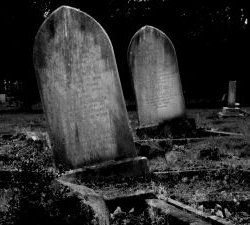Amazon YA Best Book of the Month "Rapture Practice"
Body
“Hartzler’s coming-of-age memoir is funny, laugh-out-loud funny at times, and his slide into ‘sin’ is fraught with a combination of thrill and guilt…” Omnivoracious
Discussion
"Left Behind" Movie Poster Revealed; Tim LaHaye Weighs in on Script
Body
”’It will not cover everything that the first book includes, but will be more specifically concentrated on those first few hours and the chaos of the world in the wake of millions of people vanishing with no explanation,’ according to the official website for the film, scheduled for a 2014 release.”
Discussion
The Rapture of the Church, Part 11
 Read the series so far.
Read the series so far.
When will the rapture take place?
Our Lord assured us that it was impossible to date the rapture of the church. “But of that day and hour no one knows, not even the angels of heaven, but My Father only” (Matt. 24:36; cf. vss. 42, 44, 50; and Mark 13:32-37).
Amazing! Not even the Savior knew the date of His coming again. During the days of His non-glorified human existence—for a third of a century—our Lord set aside the independent exercise of His divine attributes of greatness (omnipotence, omniscience and omnipresence), not His moral attributes (holiness, truth, love, etc.). That is the meaning of Phil. 2:7 and 8—He “made Himself of no reputation… He humbled Himself and became obedient to the point of death, even the death of the cross.”
Over and over again, our LORD explained: “I do nothing of Myself; but as My Father taught Me, I speak these things” (John 8:28); and “the Father who sent Me gave Me a command, what I should say and what I should speak…Therefore, whatever I speak, just as the Father has told Me, so I speak” (John 12:49, 50; cf. 5:20, 7:16, 8:38, 8:40, 15:15, 17:8).
Discussion
The Rapture of the Church, Part 10
 Read the series so far.
Read the series so far.
Resurrection and Corinthian/Greek philosophy
Why did so many in the church at Corinth have deep doubts about the promise of a resurrection body for believers? The amazing answer is that they did not want a resurrected body! Why not? Because they believed that such a body would be nothing more than what they already had—a weak, often painful, unimpressive thing. After all, they thought, who would really want to live forever in a resuscitated corpse?
Their drastic heresy on the design, function, significance and destiny of the human body, which they had learned from many Greek thinkers of that day, resulted in perverted views of morality and marriage. See how Paul had to deal with this in 1 Corinthians 6:15—“Do you not know that your bodies are members of Christ? Shall I then take the members of Christ and make them members of a harlot? Certainly not!” (NKJV).
In spite of the fact that we still possess sinful natures, even after being born again—a sad reality which Paul explains in Romans 7:15-25—the mortal body of the Christian is a divine temple! “Do you not know that your body is the temple of the Holy Spirit who is in you, whom you have from God, and you are not your own? For you were bought at a price; therefore glorify God in your body and in your spirit, which are God’s” (1 Cor. 6:19-20).
Discussion
The Rapture of the Church, Part 9
 Read Parts 1, 2, 3, 4 & 5, 6, 7, and 8.
Read Parts 1, 2, 3, 4 & 5, 6, 7, and 8.
The glorified bodies of believers
Paul’s reply to the questions asked by the Corinthian church about the resurrection body is highly significant and enlightening. First, the substance of that body will be different: “And what you sow [in death, like a seed that is planted], you do not sow that body that shall be, but mere grain—perhaps wheat or some other grain” (NKJV, 1 Cor. 15:37). It is amazing how different is the substance of a stalk of corn from the substance of the tiny kernel that is planted in the ground—from which it came!
On the other hand, the identity of the body that is raised or raptured is the same as the non-glorified body from which it came. “But God gives it a body as He pleases, and to each seed its own body” (1 Cor. 15:38). Perhaps we will even have the same fingerprints!
This principle of continued identity in the midst of changing substance can be illustrated quite easily. I have crossed the great Mississippi River many times. It is always the same river, but not one particle of water in that part of the river I crossed is the same—even an hour later. As for our human bodies, every molecule that was in me 10 years ago has been replaced by another. It has the same identity—but with a different substance.
Discussion
The Rapture of the Church, Part 8
 Read Parts 1, 2, 3, 4 & 5, 6 and 7.
Read Parts 1, 2, 3, 4 & 5, 6 and 7.
The dead in Christ shall rise
Mere moments after all dead Christians have been gloriously resurrected, all living Christians will be transformed and will “be caught up together with them”—without ever experiencing physical death (NKJV, 1 Thess. 4:17). What a blessed hope!
But what kind of a body will we have when we are ushered into the presence of our Lord “in the clouds,” even being with Him “in the air” (1 Thess. 4:17)? This is a question that cannot be fully answered this side of heaven. But God has given us a few hints which He intends to be sufficient for now.
First, the absolute certainty of bodily resurrection is a basic teaching of the Bible. From the book of Job more than 4,000 years ago (cf. Job 19:25-27) to the book of Daniel more than 2,500 years ago (cf. Dan. 12:2), the people of God were instructed in this doctrine. (See also Ps. 16:9, 10 and Isa. 26:19).
Tragically, some Jews denied this truth. They were the Sadducees, a small but powerful group of leaders in Israel who dominated the high priesthood and were subservient to the Roman emperor. One day they confronted the Savior and ridiculed the concept of resurrection (Matt. 22:23-33).
Discussion
He's Back!
Body
Discussion
The Rapture of the Church, Part 7
 Read Part 1, Part 2, Part 3, Parts 4 & 5, and Part 6.
Read Part 1, Part 2, Part 3, Parts 4 & 5, and Part 6.
The dead in Christ—what are they doing?
Before Christ, believers were often perplexed by the prospect of death. One of God’s great servants, Job, recorded his fear that it would be a realm of permanent nothingness—
As the cloud disappears and vanishes away,
So he who goes down to the grave does not come up. (NKJV, Job 7:9)
But later, God illumined his mind to write:
For I know that my Redeemer lives,
And He shall stand at last on the earth;
And after my skin is destroyed, this I know,
That in my flesh I shall see God,
Whom I shall see for myself,
And my eyes shall behold, and not another.
How my heart yearns within me! (Job 19:25-27)


Discussion